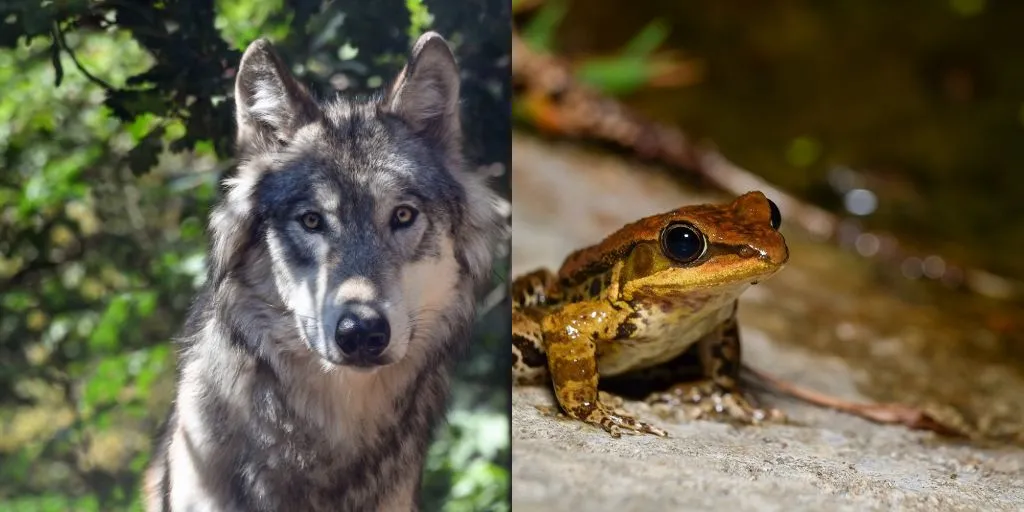Foxes are fascinating creatures, aren’t they? They’re known for their sleek, orange coats and crafty nature. Many stories and cartoons often show them slinking through the forests at night, which might make us wonder about their daily habits. Do they prefer the moonlight to the sunlight? Are they like owls, doing all their fox activities when the rest of the world is tucked into bed? But hey, maybe you’ve seen one during the day, and that made you curious. If they’re awake in the daylight too, that raises a question, doesn’t it? What is their true nature in terms of their daily activities?
In our journey through this article, we’ll explore various aspects of fox behavior, such as what they do during the nighttime, why they might choose the night for their adventures, and if all types of foxes prefer the darkness. Let’s sneak into the world of foxes and find out more about their secret lives! Are foxes nocturnal? Yes, foxes are generally nocturnal. This means they like to explore and hunt more during the night than the day. However, it’s not unusual to see them during daylight too!
Understanding Nocturnal Behavior
What Is Nocturnal Behavior?
Picture this: It’s night-time, most of us are probably fast asleep in our cozy beds. But wait, not everyone is sleeping! Some animals are wide awake and are just starting their day. Animals that love to be active during the night have a special name – they are called nocturnal animals. This night-time activity is known as nocturnal behavior.
Nocturnal animals, like owls, bats, and sometimes foxes, have special adaptations to help them get around when the sun’s not out. This might mean they have bigger eyes to soak up as much light as possible, or perhaps they have super hearing or a great sense of smell to help them navigate through the dark. Nocturnal behavior is like having a whole different world open up when another closes for the day. While we sleep, they’re exploring, hunting, and having their own adventures under the moon and stars.
Advantages of Being Nocturnal
Now, we must ponder, why would animals, including foxes, choose to be active at night? There are some pretty cool reasons! One big advantage is the quiet and calm environment. Imagine going on an adventure where fewer creatures are out and about, making it simpler and safer to explore, find food, or chat with other fox friends. Being nocturnal means that they can take their time to hunt without the risk of bigger animals coming to snatch their find away.
Secondly, imagine it’s a super-hot summer day. Phew! The sun can be pretty scorching and, for a fox with a thick, furry coat, it can get uncomfortably warm. Nighttime offers a cool and comfy alternative.
You might also have guessed that, by being awake at night, foxes can keep away from humans who are more active during the day. Less interaction with humans usually means a safer environment for them. By operating under the cover of darkness, foxes enhance their chances of a peaceful, uninterrupted night of activity.
These crafty animals use the darkness to their advantage, ensuring that their nightly escapades are successful and safe! So, the darkness isn’t just a cover for their activities but a protective shield that guards them against various challenges they might face during the day.
The Biology and Behavior of Foxes

Biology Of Foxes
Let’s dive into the world of foxes a bit more, shall we? Foxes are members of the Canidae family, which also includes familiar faces like dogs, wolves, and jackals. They’re quite small, but what they lack in size, they make up for with their cleverness and agility. Foxes have a sharp sense of hearing, sight, and smell which helps them locate their prey from far away, even when it’s super dark.
Their coats can be red, grey, brown, or even white, depending on the species and where they live. While their bushy tail, known as a ‘brush,’ is not only cute but also quite useful! They use it for balance, to communicate with other foxes, and to wrap around themselves to stay warm during chilly nights. Foxes have strong legs that allow them to run, pounce, and swim, yes, swim! They’re good swimmers too. Moreover, their wide, flat skulls and pointy noses give them that classic fox look we all recognize.
Foxes are smart, flexible in their eating habits, and they can make a home – called a den – pretty much anywhere, from forests to icy tundras and even in cities! Because they’re so adaptable, they can live in various conditions and climates, from hot deserts to icy Arctic regions. Isn’t that cool?
Crepuscular Behavior: A Twilight Activity
And here’s a fun fact! Not all foxes strictly adhere to being nocturnal. Some foxes display what scientists call “crepuscular behavior.” A big word, isn’t it? It simply means that these animals are most active during the twilight hours, just around sunrise and sunset. Picture the sky painted with shades of orange, pink, and purple – that’s when these foxes prefer to step out.
Crepuscular foxes enjoy the quietness and coolness of dusk and dawn, without being in total darkness. It gives them a break from the midday heat and allows them to explore and hunt in a different environment than their nocturnal or diurnal (daytime active) buddies. It’s like choosing to play at the park when it’s not too crowded, so they have all the space and peace to enjoy it fully!
This behavior could be driven by the types of prey that are available at these times, or simply because it helps them avoid larger predators. So, the fascinating world of foxes offers more variety in their habits than we might initially think!
Foxes’ Daily Routines
Foxes That Hunt During Daytime Hours

Even though many foxes enjoy the night, some foxes decide to hunt when the sun is shining brightly in the sky. You might be wondering, “Why would they do that?” Well, there are a few reasons. First, food can be a big motivation. Some prey, like certain birds or small mammals, might be more active during the day. If a fox is hungry and spots a yummy meal, it won’t wait for nighttime!
Another reason is where they live. In places with few humans or predators around, a fox might feel safe enough to roam around during daylight. It’s like how some of us might prefer to play outside when there are fewer people at the park. For a fox, a quiet afternoon might be a perfect time to look for food and explore.
What Do Foxes Do at Night?
Nighttime is often a busy time for foxes. Imagine them as little adventurers under the moonlight. As the world goes quiet, they start their nightly routines. Foxes might spend hours hunting for food, from juicy insects to small mammals or even fruits. They’re not picky eaters!
Apart from hunting, foxes might also play, especially if they have little fox cubs. Just like how kittens play with each other, fox cubs can be pretty playful too. Night is also a time when foxes mark their territory. They leave behind scents to let other foxes know, “This is my space!”
Lastly, after all the adventure and dinner, foxes might find a cozy spot, curl up, and take a short nap. After all, everyone needs a little rest, even night-loving foxes.
Do Foxes Come Out During the Day?
Absolutely, they do! While it’s true that many foxes prefer nighttime, it’s not uncommon to see them during the day. Some foxes have adapted to life in cities and towns where they’ve learned that daytime can offer some easy food opportunities, like leftovers from human meals.
In nature, certain things can change a fox’s routine. Maybe it’s a momma fox taking care of her hungry cubs or a young fox curious about the world. If they feel safe and there’s a reason to be out – like food or play – daytime can be just as interesting for them as the night.
So, if you ever spot a fox during the day, it’s not lost or confused. It’s just going about its foxy business, enjoying the daylight!
Are All Fox Species Nocturnal?

It’s a cool night, and imagine you’re exploring through different landscapes – icy lands, warm deserts, and dense forests. In each spot, you might find a different kind of fox! Yes, foxes live in all these places, and more, around our big, wide world. But, here comes our main question: are foxes nocturnal?
Yes, many foxes are nocturnal, but not all of them stick strictly to this pattern. Some of them prefer the calm and quiet of the night, while others might adjust their schedules based on where they live and what’s happening around them.
For instance, the red fox, which you might recognize for its bright fur and bushy tail, is mostly nocturnal but it doesn’t mind being active during the day too, especially if it’s safe from predators and gets enough food. Similarly, the fennec fox of the African deserts has enormous ears and tends to enjoy the cool desert nights, but it’s not unusual to see it during the daylight either.
In contrast, the Arctic fox, which wears a white, fluffy coat in winter, might adjust its activities based on the extreme daylight conditions in the Arctic. So, it might be active both during the long, bright Arctic days and the dark winter times.
All in all, while many fox species have a liking for nighttime activities, it’s not a strict rule. They can switch between being nocturnal, diurnal (active during the day), or crepuscular (most active during dawn and dusk), adapting to the world around them smartly and flexibly, ensuring they find food and stay safe in their specific homes across the globe. It’s fascinating, isn’t it? These little creatures sure know how to live smartly in their habitats!
Conclusion
In our journey learning about foxes, we discovered many fascinating things about these creatures. So, let’s ponder the main question one more time: are foxes nocturnal?
Yes, foxes are often nocturnal, but they’re also pretty flexible and can be active at different times depending on their needs and where they live. Isn’t that interesting? Foxes show us that they can smartly adapt to their surroundings to stay safe and find food, whether it’s in a busy city, a quiet forest, a freezing Arctic landscape, or a hot, sandy desert.
They’ve got this amazing ability to change their schedules, being out and about at night, during the day, or at twilight, always finding clever ways to survive and thrive. In our neighborhoods or in the wild, foxes continue to surprise us with their adaptability and resilience, don’t they?
Isn’t nature just full of wonders? These fluffy, smart creatures teach us that with a bit of flexibility and adaptability, life can be quite an exciting adventure! So, keep exploring, stay curious, and who knows what amazing things you’ll discover next in the wonderful world of animals!
Are Foxes Nocturnal? Frequently Asked Questions (FAQ)
Are foxes nocturnal or diurnal?
Foxes are usually nocturnal, meaning they like to explore and hunt more during the night. But they can also be active in the day, which is called diurnal activity, especially when they need to find food or feel safe in their surroundings. So, they can be both!
When are foxes most active?
Foxes are often most active at night because it’s quieter and safer for them. However, foxes can be active during the day too, especially when they need to find extra food or if they live in a place with fewer dangers!
Is it normal to see a fox in the daytime?
Yes, it’s pretty normal to see a fox during the daytime! Foxes are super smart and can change their schedules to be safe and find food, even when the sun is shining brightly!
Why does a fox scream at night?
Foxes scream at night mainly to talk to other foxes. This loud, eerie sound helps them claim their territory, tell other foxes they’re around, or even find a friend to make little fox families with. It’s like their own wild way of chatting!









